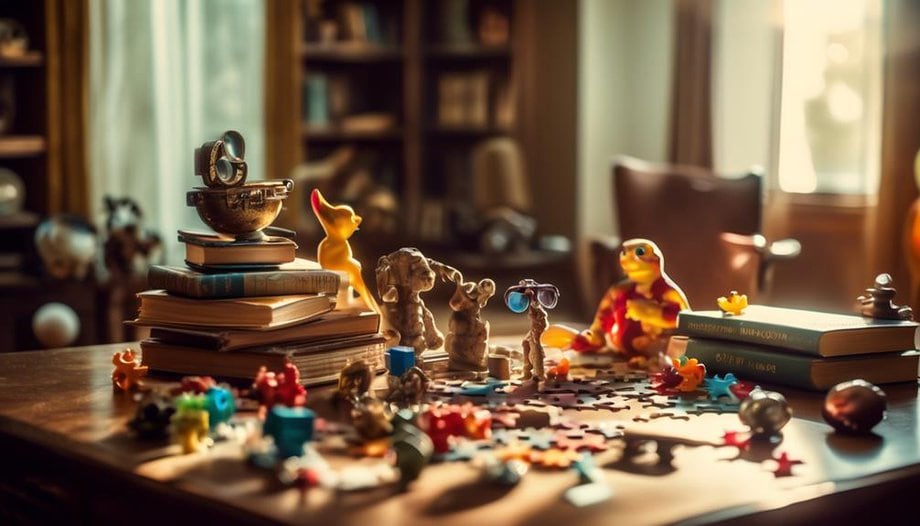Encouraging Curiosity and Inquisitiveness in Toddlers

Yes, curiosity in toddlers is an inherent trait that can be nurtured and encouraged through strategies like open-ended play and engaging in hands-on activities.
These strategies allow toddlers to explore their environment and discover new things. Open-ended play, such as providing them with blocks or toys that can be used in multiple ways, helps stimulate their imagination and problem-solving skills. Hands-on activities, like sensory play or art projects, provide toddlers with opportunities to engage their senses and express themselves creatively.
By promoting these types of activities, parents and caregivers can create an environment that supports and cultivates a toddler's curiosity. This helps them develop skills such as critical thinking, exploration, and a love for learning. It also fosters their natural sense of wonder and helps them develop a lifelong passion for discovery.
Encouraging curiosity in toddlers is essential for their overall development and sets the foundation for future learning. It encourages them to ask questions, seek answers, and explore the world around them. By fostering curiosity, parents and caregivers are helping toddlers become active and engaged learners who are eager to discover and understand the world.
Key Takeaways
- Embracing open-ended play and providing opportunities for exploration
- Fostering curiosity and inquisitiveness through questions and reading
- Supporting problem-solving and critical thinking skills
- Creating a safe and engaging environment to nurture curiosity and inquisitiveness
Embrace Open-Ended Play
Embrace the endless possibilities of open-ended play and watch as your toddler's curiosity flourishes. Unstructured play is a vital aspect of your child's development, allowing them to explore their imagination and unleash their creativity. When you provide an environment that encourages creative exploration, you're giving your toddler the freedom to discover and learn at their own pace.
Unstructured play refers to activities that aren't directed or controlled by adults. Instead, they're child-led, giving your little one the opportunity to make their own choices and decisions. This type of play allows them to use their imagination and problem-solving skills, fostering their curiosity and natural desire to learn.
Creative exploration is another essential aspect of open-ended play. It involves experimenting, inventing, and discovering new things. Whether it's building a tower with blocks, creating a masterpiece with art supplies, or pretending to be a chef in their play kitchen, your toddler is engaging in creative exploration. This type of play helps them develop critical thinking skills, boosts their confidence, and enhances their ability to think outside the box.
Provide Opportunities for Exploration
Are you ready to embark on a journey of curiosity with your toddler?
Providing opportunities for exploration is key to nurturing their inquisitive minds.
Through hands-on learning experiences and open-ended play activities, you can stimulate their curiosity and help them develop essential skills.
Hands-On Learning Experiences
Engage your toddler's natural curiosity and foster their love for learning through hands-on experiences that provide endless opportunities for exploration. Hands-on learning experiences are crucial in helping toddlers develop their sensory and cognitive skills.
Here are five ways to incorporate sensory play and creative experiments into your toddler's learning journey:
- Sensory Bins: Fill a bin with materials like rice, sand, or water, and let your toddler explore different textures and sensations.
- Messy Art: Encourage your toddler to use their hands and explore different art materials like paints, clay, or playdough to stimulate their creativity.
- Nature Walks: Take your toddler on nature walks where they can touch leaves, listen to birds, and feel different textures in their environment.
- Cooking Together: Involve your toddler in simple cooking activities that allow them to measure ingredients, mix, and taste, fostering their sense of taste and smell.
- Science Experiments: Engage your toddler in simple science experiments like mixing colors, making volcanoes, or exploring the properties of water.
Open-Ended Play Activities
Encourage your toddler's sense of wonder and discovery with open-ended play activities that provide endless opportunities for exploration and learning. Sensory exploration and creative problem solving are key components of these activities, allowing your child to engage with their environment in a meaningful way. By providing open-ended materials and experiences, you're giving your toddler the chance to use their imagination, think critically, and develop important skills.
Here is an example of a simple open-ended play activity that promotes sensory exploration and creative problem solving:
| Materials | Instructions | Learning Outcomes |
|---|---|---|
| Shaving foam | Spread shaving foam on a tray or table. Encourage your toddler to explore the texture, make marks, and create designs using their fingers or tools. | – Sensory exploration: Your toddler will engage their sense of touch and discover different textures. – Creative problem solving: They will experiment with different ways to manipulate the foam, fostering problem-solving skills. – Language development: This activity provides opportunities for describing sensations and discussing the changes in texture. |
Engaging your toddler in open-ended play activities not only supports their development but also fosters a love for learning and exploration. So, grab some materials, set up a play area, and watch as your child's curiosity and imagination soar!
Encourage Asking Questions
As your toddler's natural curiosity blossoms, fostering a stimulating environment that nurtures their inquisitiveness becomes crucial. Encouraging your child to ask questions is a powerful way to fuel their curiosity and promote their cognitive development.
Here are some strategies to help you encourage asking questions in your toddler:
- Create a safe space: Let your child know that no question is too silly or insignificant. Create an environment where they feel comfortable asking anything that comes to mind.
- Be an active listener: Show genuine interest in your child's questions. Give them your full attention and respond thoughtfully, even if you don't have all the answers. This will encourage them to continue seeking knowledge.
- Ask open-ended questions: Encourage independent thinking by asking your child open-ended questions. This will stimulate their critical thinking skills and help them develop a growth mindset.
- Explore together: Engage in activities that prompt questions and exploration. Take nature walks, visit museums, or engage in hands-on experiments. These experiences will fuel your child's curiosity and encourage them to ask more questions.
- Foster a love for reading: Read books together and encourage your child to ask questions about the story. This won't only enhance their language skills but also ignite their curiosity about the world around them.
Foster a Love for Books and Reading
Immerse your toddler in a world of wonder and imagination through the magic of books and the joy of reading. Creating a love for books and reading from an early age is a gift that will last a lifetime. To foster this love, consider incorporating storytelling sessions and creating a special reading corner in your home.
Storytelling sessions are an excellent way to engage your toddler's imagination and curiosity. Find books with colorful illustrations and captivating stories that will capture their attention. Use different voices and expressions to bring the characters to life. As you read together, encourage your child to ask questions, make predictions, and share their thoughts and feelings about the story. This interactive experience won't only enhance their language skills but also deepen their connection to books.
Creating a reading corner in your home provides a dedicated space for your toddler to explore books independently. Fill the area with a variety of age-appropriate books, comfortable seating, and soft cushions. Make it cozy and inviting, a place where your child can curl up with a book and get lost in its pages. Visit the reading corner regularly, and encourage your toddler to choose books that interest them. By giving them autonomy in their reading choices, you're nurturing their love for books and empowering them to become lifelong readers.
Engage in Hands-On Activities
To further stimulate your toddler's curiosity, let's now explore the exciting world of hands-on activities. Engaging in hands-on activities isn't only fun, but it also allows your little one to explore and learn about the world around them in a tangible way. Here are five ideas to get you started:
- Nature walks and outdoor adventures: Take your toddler on nature walks to explore the wonders of the outdoors. Encourage them to touch leaves, feel the bark of trees, and listen to the sounds of birds chirping. This won't only stimulate their curiosity but also foster a love for nature.
- Messy play: Sensory play is a great way to engage your toddler's senses and encourage their curiosity. Set up a messy play station with activities like finger painting, playing with sand or water, or exploring different textures with sensory bins. This hands-on exploration will stimulate their creativity and help them learn about cause and effect.
- Cooking and baking: Involve your toddler in simple cooking and baking activities. Let them mix ingredients, measure, and decorate. This hands-on experience won't only teach them about food and nutrition but also develop their fine motor skills.
- Building and construction: Provide your toddler with building blocks, Legos, or other construction toys. Encourage them to build and create their own structures. This hands-on activity will enhance their problem-solving skills, spatial awareness, and imagination.
- Gardening: Teach your toddler about plants and gardening by involving them in planting and tending to a small garden. Let them dig in the soil, water the plants, and watch them grow. This hands-on experience will nurture their love for nature and teach them about responsibility.
Engaging in hands-on activities is a wonderful way to encourage your toddler's curiosity and promote their overall development. So, get ready to embark on exciting adventures and let your little one explore the world through their senses.
Promote Curiosity Through Nature Experiences
Ready to ignite your toddler's curiosity?
One of the best ways to do so is by promoting nature experiences.
Take your little one on outdoor explorations, where they can marvel at the wonders of the natural world.
Engage them in nature-based activities that allow them to observe, touch, and interact with their surroundings.
Through hands-on learning in nature, your toddler will develop a sense of wonder and curiosity that will last a lifetime.
Outdoor Explorations
Embark on an exciting journey of discovery as you watch your toddler's curiosity come alive through outdoor explorations and the wonders of nature. By engaging in outdoor games and nature walks, you can fuel their inquisitive nature and help them develop a deeper understanding of the world around them.
- Outdoor games: Encourage your toddler to play games like scavenger hunts or hide-and-seek in the backyard. This won't only keep them active but also stimulate their curiosity as they explore their surroundings.
- Nature walks: Take your little one on nature walks in local parks or nature reserves. Encourage them to touch leaves, smell flowers, and observe insects. This hands-on experience will spark their curiosity and foster a love for nature.
- Collecting treasures: Encourage your toddler to collect natural treasures like rocks, leaves, or pinecones during outdoor explorations. This won't only engage their curiosity but also teach them about different textures and colors.
- Animal spotting: Teach your toddler to observe and identify birds, squirrels, or other animals they encounter during outdoor adventures. This will help them develop an appreciation for wildlife and ignite their curiosity about different species.
- Sensory experiences: Engage your toddler's senses by allowing them to feel the grass, listen to the sounds of nature, and observe the changing seasons. These sensory experiences will encourage their curiosity and deepen their connection to the natural world.
Through outdoor explorations, your toddler will embark on a journey of curiosity and wonder, discovering the beauty and intricacies of nature. It's in these moments that their imagination and inquisitiveness will flourish, shaping them into lifelong learners and lovers of the world around them.
Nature-Based Activities
Explore the wonders of nature with your toddler through engaging and curiosity-fueling nature-based activities.
Nature-inspired crafts and sensory nature play are excellent ways to ignite your little one's curiosity and foster a deep connection with the natural world.
Encourage your toddler to collect leaves, rocks, and flowers during outdoor explorations, and then use these treasures to create beautiful crafts together.
By engaging their senses and allowing them to touch, smell, and explore the natural materials, you're providing a rich sensory experience that will captivate their inquisitive minds.
Let them feel the textures of different leaves, listen to the rustling sound of the wind, and watch the vibrant colors of flowers.
Through these activities, your toddler will develop a sense of wonder, curiosity, and appreciation for the natural world around them.
Hands-On Learning
To foster your toddler's curiosity, immerse them in hands-on learning experiences that connect them with the wonders of nature. By engaging in sensory exploration and creative expression, your child will develop a deeper appreciation for the world around them.
Here are five ways you can promote curiosity through nature experiences:
- Take your toddler on nature walks, allowing them to touch and feel different textures, smell flowers, and listen to the sounds of birds.
- Set up a nature exploration table in your home, filled with leaves, rocks, and other natural objects for your child to examine and investigate.
- Create a nature-inspired art corner, where your toddler can paint with leaves, make collages using natural materials, or create sculptures using sticks and stones.
- Plant a small garden together, allowing your child to experience the joy of growing their own plants and understanding the importance of caring for nature.
- Visit local parks or nature reserves, where your toddler can observe animals, insects, and plants in their natural habitats.
Support Problem-Solving and Critical Thinking Skills
Encourage your toddler's problem-solving and critical thinking skills by providing opportunities for hands-on exploration and discovery. Supporting your child's development in these areas is crucial for their overall growth and future success.
There are several ways you can foster problem-solving and critical thinking skills in your toddler.
Firstly, encourage open-ended play. Provide your child with toys or materials that allow for creativity and problem-solving. For example, building blocks can be used to create various structures, challenging your toddler to think critically about balance and stability.
Secondly, ask open-ended questions to stimulate your child's critical thinking. Instead of giving them the answers, encourage them to find solutions on their own. For instance, if your child is struggling to fit a puzzle piece, ask them how they think it should be placed and why.
Additionally, engage in activities that require problem-solving. This could involve simple tasks like sorting objects by color or shape, or more complex challenges like building a small obstacle course for your toddler to navigate.
Frequently Asked Questions
How Can I Encourage My Toddler to Ask More Questions?
To encourage your toddler to ask more questions, create a supportive environment where curiosity is celebrated. Engage in hands-on activities, read together, and expose them to nature. Encourage problem-solving and critical thinking skills to nurture their inquisitiveness.
What Are Some Ways to Foster a Love for Reading in Toddlers?
To foster a love for reading in toddlers, establish reading routines by incorporating books into daily activities. Make storytime interactive, using animated voices and asking questions. This will engage their curiosity and create a positive association with reading.
How Can I Engage My Toddler in Hands-On Activities That Promote Curiosity?
To engage your toddler in hands-on activities that promote curiosity, try incorporating sensory play into their playtime. Encourage them to explore the world through art, such as painting or sculpting, to spark their inquisitiveness.
What Are Some Examples of Nature Experiences That Can Promote Curiosity in Toddlers?
When it comes to promoting curiosity in toddlers, outdoor exploration and animal encounters are great examples of nature experiences that can capture their interest and spark their inquisitive minds.
How Can I Support My Toddler's Problem-Solving and Critical Thinking Skills?
You can support your toddler's problem-solving and critical thinking skills by providing opportunities for them to explore and discover. Encourage curiosity and inquisitiveness in young children by asking open-ended questions and engaging in imaginative play together.











